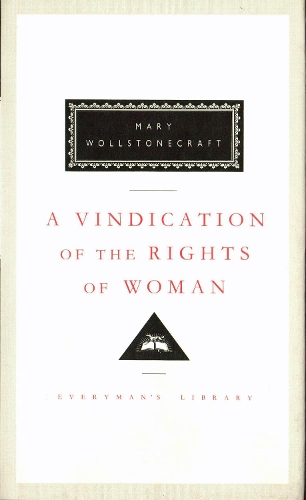
A Vindication of the Rights of Woman
(Hardback)
Available Formats
Paperback
Published: 2nd March 2015
Paperback
Published: 2nd March 2015
Hardback
Published: 15th March 2013
Paperback
Published: 15th March 2013
Paperback
Published: 19th November 2004
Paperback
Published: 7th March 2023
Hardback
Published: 28th April 2020
Hardback
Published: 15th May 1992
Paperback
Published: 2nd September 2004
Paperback
Published: 16th June 2025
Paperback
Published: 1st April 2025
Publishing Details
A Vindication of the Rights of Woman
By (Author) Mary Wollstonecraft
Everyman
Everyman's Library
15th May 1992
4th June 1992
United Kingdom
Classifications
General
Non Fiction
Feminism and feminist theory
305.42
Physical Properties
Hardback
280
Width 132mm, Height 210mm, Spine 23mm
410g
Description
Writing just after the French and American revolutions, Mary Wollstonecraft firmly established the demand for womens emancipation in the context of the ever-widening urge for human rights and individual freedom that followed in the wake of these two great upheavals. She thereby opened the richest, most productive vein in feminist thought; and her success can be judged by the fact that her once radical polemic, through the efforts of the innumerable writers and activists she influenced, has become the accepted wisdom of the modern era. The present edition contains a substantial essay by a major scholar to celebrate the bicentenary of publication in 1792.
Author Bio
Mary Wollstonecraft was born in 1759 in Spitalfields, London. After an unsettled childhood, she opened a school following which, her first work, Thoughts on the Education of Daughters, was published in 1787. After a stint as governess in Ireland, she continued to write and published several other works including Mary (1788), A Vindication of the Rights of Men (1790) and her most famous, A Vindication of the Rights of Woman (1792). That year she travelled to Paris where she met Gilbert Imlay, by whom she had a daughter, Fanny. Her travels around Scandinavia with her baby daughter in 1795, inspired her travel book Letters Written during a Short Residence in Sweden, Norway and Denmark, but on returning to London Imlays neglect drove her to two suicide attempts. In 1797 she married William Godwin, and had a daughter, the future Mary Shelley. Wollstonecraft died of septicaemia shortly after the birth.
